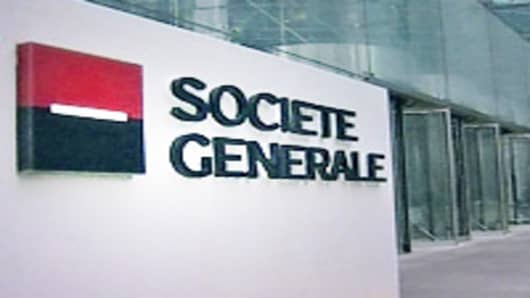On Dec. 16, 2008, the global financial system was in disarray, the Bernard Madoffscandal was less than a week old, and U.S. authorities were bearing down on Texas financier Allen Stanford. That day, Societe Generale mysteriously debited $95 million from a Stanford Financial Group account at Soc Gen’s private bank in Geneva, Switzerland.
Exactly two months later, the Securities and Exchange Commission accused Stanford of running a $7 billion Ponzi scheme, and a court ordered his global financial empire placed in receivership.
Now, with Stanford on trial in Houston on 14 criminal counts, CNBC has learned the $95 million debit—and the reasons behind it—are about to take center stage. Documents surrounding the transaction are included in the government’s evidence list, filed in court last month.
Stanford, 61, has pleaded not guilty to the criminal charges.
Stanford investors alleged in a lawsuit in December that Soc Gen took the money to satisfy a personal loan he had taken out four years earlier.
“SG Suisse had a special, extensive, symbiotic and nefarious relationship with Stanford from which it greatly benefited,” the lawsuit says, alleging that by December 2008, bank officials “realized the Stanford Entities were insolvent,” and the bank wanted its money bank. The investors claim the money belongs to them.
In the criminal case, prosecutors have alleged that the Swiss bank account—Soc Gen account number 108731—was a slush fund of sorts that Stanford used to pay bribes to regulators and his auditors, a charge Stanford’s attorneys have denied.
In court today, former Stanford accountant Henry Amadio testified about three payments from the account between 2005 and 2008 to Stanford’s Antiguan auditor—CAS Hewlett—totaling more than $260,000.
“I do not know of any legitimate reason why these payments were made,” Amadio testified. “They were not tracked.”
It is not the only connection between Stanford and the bank. His personal banker, Soc Gen Executive Vice President Blaise Friedli, also served on Stanford’s international advisory board, the suit says.
Societe Generale spokesman Joylon Barthorpe would not comment on the suit or media reports the bank itself is under investigation by U.S. prosecutors.
“Societe Generale is cooperating with the Swiss and foreign authorities,” Barthorpe told CNBC. He would not say whether Blaise Friedli, who has not been accused of wrongdoing, is still employed by the bank.
At the Stanford trial in Houston, now in its second week, the Soc Gen connection is expected to emerge during the testimony of former Stanford Chief Financial Officer James Davis. Davis pleaded guilty to three criminal counts in 2009 and has been cooperating with authorities. He could take the stand as soon as this afternoon.
Defense attorneys have called Davis a liar who is fabricating stories about Stanford to save his own skin. They also have claimed that Davis was responsible for the company’s operations, and that the firm only became insolvent after the SEC had it placed in receivership in 2009.
Additional reporting by Jocelyn Lane in Houston



